
5G PREPARES FOR TWO MAJOR CHALLENGES: CYBERSECURITY AND ARTIFICIAL INTELLIGENCE
- “Artificial Intelligence evolves so rapidly that new threats appear quite regularly,” said Juan Miguel Pulpillo, Expert and Coordinator of the Center for Industrial Cybersecurity (CCI).
- “94% of the Spanish population between 16 and 74 years old has a mobile device, which makes it a potential victim of a cyberattack,” said Gabriel Gonzalez, Deputy Prosecutor for Computer Crime and Deputy Prosecutor in the CCAA of Andalusia of the Data Protection Delegate of the Attorney General’s Office, for whom the AI offers “many possibilities for cybercriminals” to perpetrate their crimes.
- “Until now we have always talked about resistance, but nowadays the important thing is to know how to recover from a cyberattack,” said Sergio de los Santos, director of Innovation and Labs at Telefónica Tech.
- The 5G Forum, “Where 5G leaders meet” closed its seventh edition and is already preparing the 2025 edition.
The 5G Forum, “Where 5G leaders meet” concluded its seventh edition last Friday with the celebration of its fifth and final day, dedicated entirely to cybersecurity and Artificial Intelligence in 5G, 6G and autonomous mobility network environments.
“AI plays a key role in cybersecurity.”
Juan Miguel Pulpillo, Expert and Coordinator of the Center for Industrial Cybersecurity (CCI), explained that “AI plays an essential role in cybersecurity by helping to identify, prevent and respond to cyber threats faster and more accurately”. In his opinion, AI’s ability to analyze large-scale data and make automated decisions makes it an “invaluable tool in protecting systems and networks against malicious attacks.”
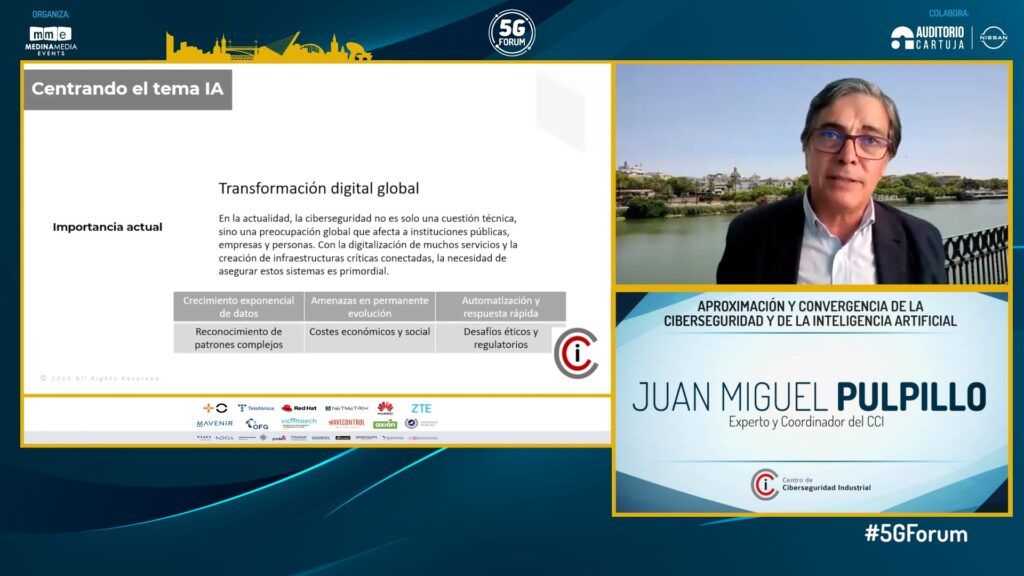
“Artificial Intelligence evolves so quickly that new threats appear quite regularly,” said Juan Miguel Pulpillo, for whom 6G will bring a paradigm shift in which users will not only be concerned with connecting devices and generating data, but will “extract information and make decisions in real time”, which will mean having additional security against cyberattacks.
“Computer crime is skyrocketing.”
For his part, Gabriel González, Delegate Prosecutor for Computer Crime and Deputy Prosecutor in the Autonomous Region of Andalusia of the Data Protection Delegate of the State Attorney General’s Office, gave an overview of the situation at national level in terms of cybersecurity and new technologies; and how “crimes related to computer crime are soaring due to the massive use of new technologies”. Internet sex crimes, computer fraud and cyber gender violence are the crimes that have increased the most, favored by new technologies.
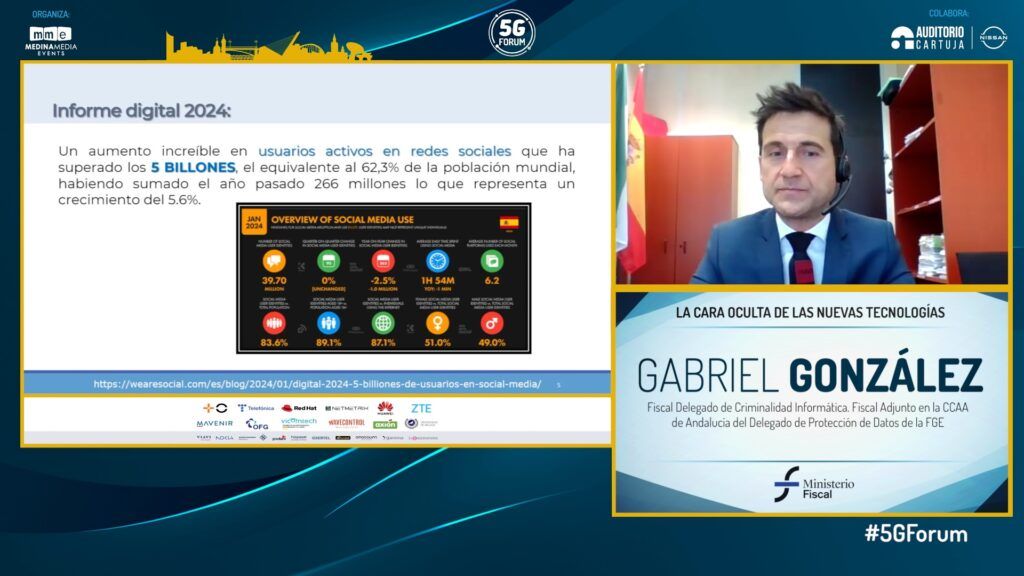
As a remarkable fact, the prosecutor Gabriel Gonzalez, said that “94% of the Spanish population between 16 and 74 years old has a mobile device, which makes it a potential victim of a cyberattack”. This means that almost the entire Spanish population is exposed to a cyberattack, so the challenge in terms of security in 5G and future 6G networks is enormous. Regarding Artificial Intelligence, the prosecutor acknowledged that it is greatly favoring our lives, but in the criminal field it is also generating “many possibilities for cybercriminals” to perpetrate their crimes.
“There has been a major paradigm shift.”
“Until now we have always talked about resisting, today the important thing is to know how to recover from a cyberattack,” said Sergio de los Santos, director of the Innovation and Labs area at Telefónica Tech, who warned of the “major paradigm shift” that has taken place in cybersecurity. “Being resilient in security means being able to survive or overcome an attack”, emphasized the Telefónica Tech representative during a presentation in which he shared the challenges faced by organizations in terms of cybersecurity and how they can develop their business in a cyber-resilient way, with the right strategy and partners.
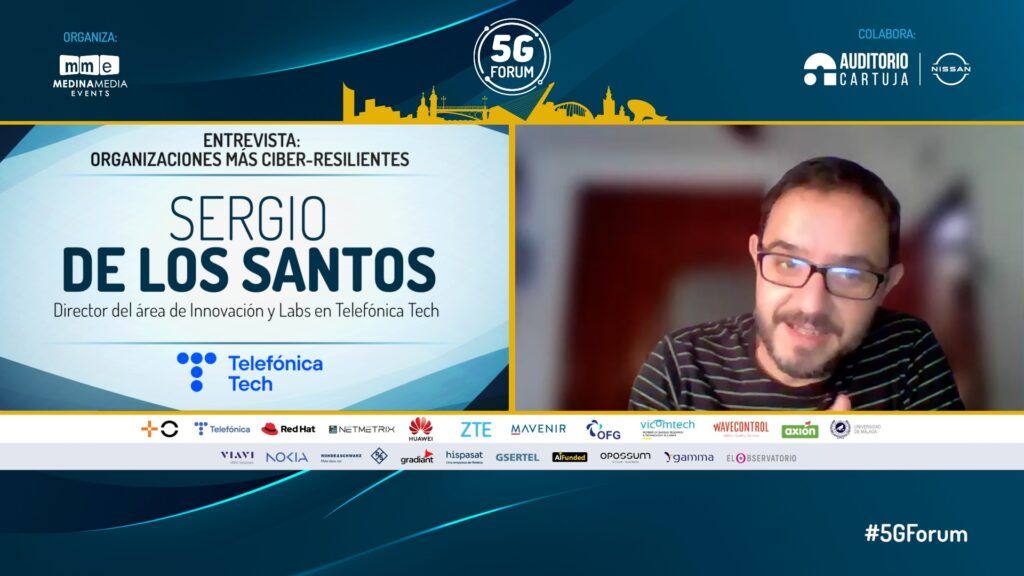
In the opinion of Sergio de los Santos, companies have assumed that “they are going to suffer attacks and that these are going to be successful”. “SMEs have to understand that they are going to be attacked and that cybersecurity is not a utopia,” he considered before assuring that “AI is going to impact digitization and cybersecurity processes,” both on the side of the attackers and on the side of the companies. “We have moved to cybersecurity being the foundation on which digitalization is built. This small detail changes everything because we start from the zero trust concept, that is, don’t trust anything or anyone,” he concluded.
“By 2025, incident fraud will be €42.5 billion.”
Similarly, José Ángel Capote, Cyber Security and Privacy Officer (CSPO) at Huawei Spain, discussed the cybersecurity knowledge base that has enabled the GSMA MCKB (Mobile Cyber Security Knowledge Base) to improve resilience against cyber-attacks on 5G mobile communications networks and how Huawei is helping to achieve this goal of improving cyber-resilience. From his point of view, the key in this framework is to “have clear processes and mechanisms” from which to improve year by year so that “networks can adapt to new threats” whose appearance cannot be avoided.
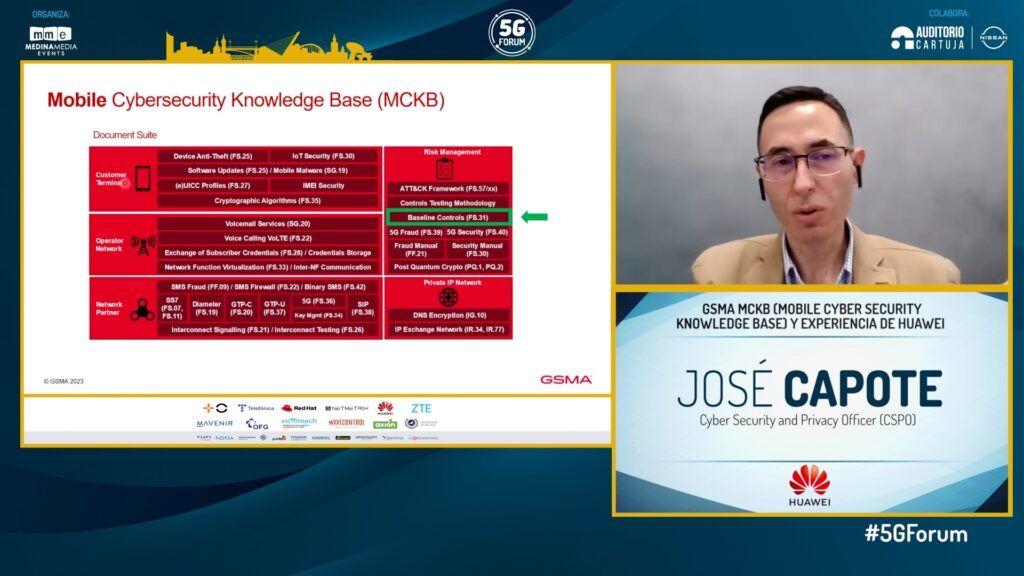
In fact, Capote launched a worrying figure, since “between now and 2025 the potential impact of security incidents and fraud will be 42,500 million euros”. “Just as the bad guys are always going to improve, the ideal is for networks to increase their level of protection against these cyberattacks”, said José Ángel Capote, for whom one of the main aspects to take into account at a business level is that “cybersecurity should not be the first thing to be deprioritized” when it comes to accounting in a company, an organization or any institution.
“Cybersecurity is vital to detect new threats.”
One of the main use cases associated with 5G is autonomous mobility, which over the last 20 years has undergone a significant series of ups and downs. Since in 2021 investment soared to $12 billion in 264 projects, in 2023 this investment fell to $5 billion, dropping up to 80% of the ‘startups’ that emerged. In spite of these discouraging data, “the situation is not as bad as it is being sold”. This was stated by Aitor Fernández, president and co-founder of AEVAC (Spanish Association of Connected Autonomous Vehicles).
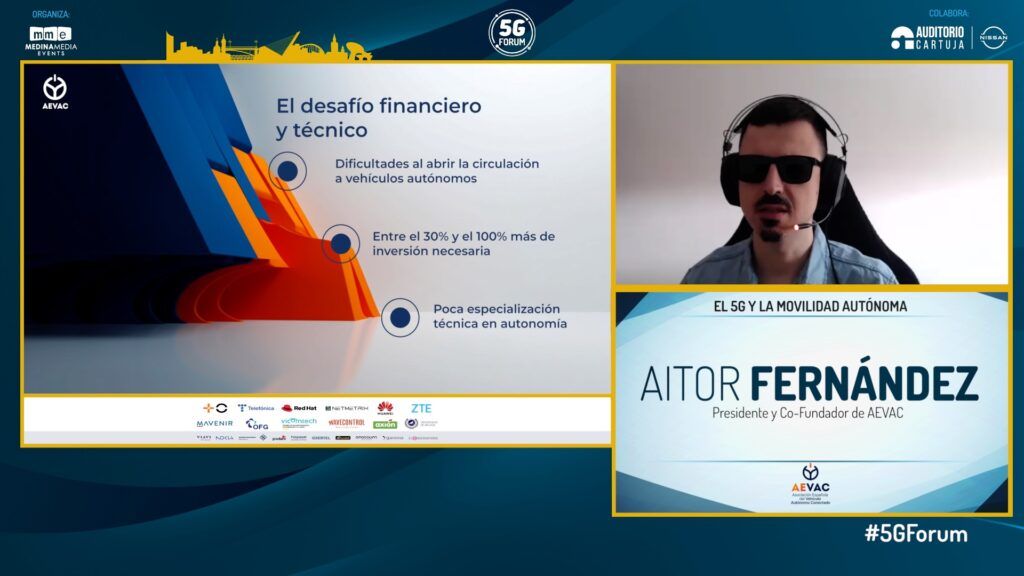
“In terms of autonomy, we have a clear path: connectivity, data exploitation, the hybrid cloud where we mix edge computing with the autonomous vehicle, 5G and data centers and, finally, autonomous mobility,” said Aitor Fernández, for whom in terms of cybersecurity it will be vital to “identify threats that are new and that have not been experienced in traditional driving”. “Vehicles will have to connect with other vehicles, with the infrastructure, with the network and each of these connections is a potential threat that endangers our privacy and our physical integrity,” Fernandez maintained. He also spoke about the SELFY Project, which aims to establish the basis for the development of self-assessment and self-protection tools to improve the resilience of cooperative connected autonomous mobility systems.
“Cybersecurity cannot be seen as a goal, but rather as a continuous process” and this is where Artificial Intelligence comes into play, which can help vehicles in a multitude of aspects such as, for example, integrating image recognition. “It’s fascinating what we are experiencing and every day that passes the advances are more important. There are going to be changes and we should not be afraid of those changes,” he concluded.
A meeting recognized in the industry and among the media
The 5G Forum has established itself as a reference forum in the technology sector, as it is a unique showcase with a multidisciplinary vocation to publicize every year the use cases and success stories of operators, companies, universities and institutions. International, national, regional and local media have echoed this seventh edition: Canal Sur, Europa Press, Agencia EFE, ABC, Diario de Sevilla, La Razón, La Vanguardia, Cadena SER, Radio Intereconomía, El Correo, among others. The 5G Forum will return in 2025 with the celebration of its eighth edition.
All the presentations of this and previous editions can be viewed through ‘The Observatory’, the digital platform of Medina Media Events, where all the interventions will be available 24/365 for on-demand consumption, like Netflix, but free of charge. In addition, registered 5G Forum professionals will be able to hold video meetings with experts and other attendees. They will also be able to consult breaking news thanks to remain connected throughout the year to ‘The Observatory’.
The seventh edition of the 5G Forum is organized by Medina Media Events and is supported by MASORANGE, Telefónica, Red Hat, Netmetrix, Huawei, ZTE, Mavenir, OFG, Vicomtech, Wavecontrol, Axión, the University of Málaga, Viavi Solutions, Nokia, Rohde & Schwarz, Gradiant, Hispasat, Gsertel, AI Funded, Opossum and Gamma Solutions, among others.